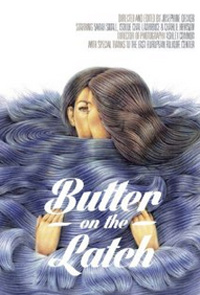Pass the Butter: Decker Cooks Up Female & Peyote Driven Experiment
 Serving as a statement more so than a film, Butter on the Latch, tosses away convention and narrative traditions resulting in what can be described as a kooky drug-addled ride that will most likely leave viewers unable to make heads or tails. Much like a dizzying trek through the woods, where coincidentally most of the story takes place, the narrative neglects the use of a compass. Its directionless approach comes off rather frustrating and off putting though there is a rare and uninhibited rawness that gleams every now and then. In her first feature, Josephine Decker, a relatively new filmmaker/artist, chooses to ignore cohesion and consistency in order to provide a sensory abstraction.
Serving as a statement more so than a film, Butter on the Latch, tosses away convention and narrative traditions resulting in what can be described as a kooky drug-addled ride that will most likely leave viewers unable to make heads or tails. Much like a dizzying trek through the woods, where coincidentally most of the story takes place, the narrative neglects the use of a compass. Its directionless approach comes off rather frustrating and off putting though there is a rare and uninhibited rawness that gleams every now and then. In her first feature, Josephine Decker, a relatively new filmmaker/artist, chooses to ignore cohesion and consistency in order to provide a sensory abstraction.
In a very Thoreauan gesture, Sarah (Sarah Small) retreats into a the middle of the woods, participating in a Kumbaya-esque camp where the members sing and play in a drum circle, as if to transcend above their urban and materialistic selves. There, she spends time with her friend Isolde (Isolde Chae-Lawrence) who exhibits an easy and refreshing charm. At a certain point, the floating semblance of a story begins to disintegrate even further as Sarah begins to endure what can only be described as hallucinations and an overload caused by either herself, her surroundings, or a combination of the two. From there, the film becomes even more surreal and unanchored, creating an ambiguous movement that does not move forward but instead seems to collapse on itself.
Experimental in form and organic in technique, Butter on the Latch tosses conventional narrative to the wind and the results offer little in terms of substance to endorse such an approach. The opening few minutes do not at all feel conducive to the rest of the film while something substantial does occur in the final quarter, it feels altogether too little too late. Though the improvised dialogue exhibits a strong sense of verite (though not exactly conducive to the story) and the chemistry between the two leading ladies is palpable, there is a strain to see how all of it connects to the larger picture which seems to largely be missing. The dramatics come out of nowhere and at a time where the audience has already decided whether or not it buys into it all. The visual images though striking (cinematography rather irking at times) does not seem to serve a greater purpose; they seem to be there simply because of its ability to stand alone.
Despite all of its mishandlings, it’s difficult to completely dismiss Butter on the Latch as an error of ways. Digging through and pushing past all of its convolutions and pretenses, there is potential (as seen in the last few minutes of the film). However, it goes to show that simply trying to be different is not necessarily or always the most important statement to make.
★½/☆☆☆☆☆


